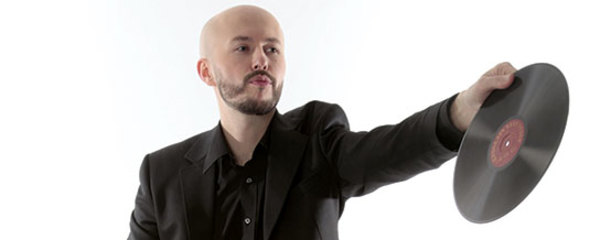Wax Tailor: Hip-Hop Nostalgia
A native son of the City of Lights, Wax Tailor (otherwise known as JC Le […]
Wax Tailor: Hip-Hop Nostalgia
A native son of the City of Lights, Wax Tailor (otherwise known as JC Le […]

A native son of the City of Lights, Wax Tailor (otherwise known as JC Le Saout) walks a tightrope between geographies and genres. Parisians forget he’s actually a local, while Americans consider his embrace of hip-hop’s explosive golden era anachronistic in this age of blingy, ego-driven rap. Their loss, and not just because the noir-hop soundtracker actually scored a couple songs for the forthcoming Cedric Klapisch movie, Paris, or because Wax Tailor recently manned the wheels of steel for the Cannes Film Festival. Whether it’s scoring a Juliette Binoche kiss or crafting a haunting track for his recent release, Hope & Sorrow, with U.S. soul diva Sharon Jones, Le Saout has a je ne sais quoi for sonics.
“I began as a big fan of bands like Public Enemy, Eric B. & Rakim, and EPMD,” Le Saout explains, “as well as composers like John Barry, Lalo Schifrin, and Francois de Roubaix. I was totally compulsive about listening to music.”
His previous effort, Tales of Forgotten Melodies, is evidence of that compulsion, filled as it was with brooding arrangements of Hitchcockian splendor, as well as head-bobbing paeans to a hip-hop yesterday that Wax Tailor refuses to bid adieu.
“I feel a kind of nostalgia about the golden years,” he adds. “We’ve still got great producers like Edan or Madlib, but I’m happy to hear one classic album each year, when I used to hear about 15 a year in the early ‘90s. But I really think that there is a connection between the soundtrack and the hip-hop sound. The pulse of the rhythm, the emotions of the arrangements.”
And while the title Hope & Sorrow may indicate no variation on that lovelorn theme, Wax Tailor’s newest record owes more to Herbaliser than it does Bernard Hermann. Especially with the vocal aid of Sharon Jones on the poignant “The Way We Lived.”
“I wanted to mix early ’70s soul with my sound,” Le Saout says, “and I was convinced that Sharon could bring something special to the track. It was a great honor to work with her.”
Their productive culture mash may become the norm in our digital age, where Google Maps brings Paris to your bedroom while internet labels and audiences evolve beyond geographical boundaries.
“In France,” Le Saout explains, “the hip-hop scene is really developed, with more and more alternatives like instrumentals, turntablists, abstracts, and rap. It’s possible to get out of the traditional formats. I think that people don’t care anymore about where the music is coming from. We’re on the internet now. People judge you by your sound.”

